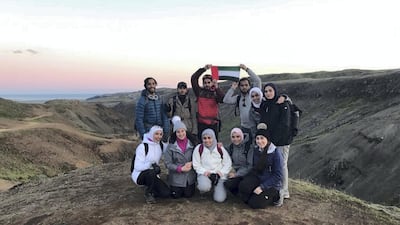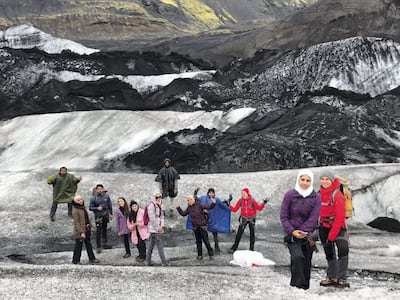A group of Emirati students spent two days camping in Iceland without electricity while researching ways to implement solar energy practices in the UAE.
Eleven Emirati students self-funded a trip to Iceland - a country where 85 per cent of all houses use geothermal energy and almost 100 per cent of electricity is generated through renewables – to learn how the country harnesses its resources into clean energy.
"It's a good destination for clean energy," said Aysha AlRumaithi, a 22-year-old graduate in sustainable and renewable energy from the University of Sharjah. "We learnt about their energy policies, history and their landscape while on a two-day camping trip without electricity."
The group worked on two projects following the United Nations' pillars of sustainable development, as part of the US-based Green Programme which has sustainability initiatives around the world. "We worked on a solar consultation company for the UAE," she said. "It opened my eyes on a country that doesn't use any fossil fuels and it's one of the greenest countries in the world."
As geothermal and hydropower are not available in the UAE, the students settled on solar as a viable contributor to the UAE's renewable energy future.
“I learnt how to harness the resources we have,” said Tawaddod AlKindi, a master’s student in material science and engineering at Masdar. “We thought about working on private properties in the UAE that are unused and see what resources they have like solar or organic waste and come up with suitable plans for them. We can do a lot here with solar energy and organic and agricultural waste so we did an analysis and it’s feasible for people to start selling energy in the UAE.”
_______________
Read more:
‘Near-pefect’ solar absorber highlights bright outlook for UAE’s sun-powered future
UAE youth turn their attention to renewable energy and sustainability
_______________
She said she hoped to implement the project in the UAE one day. "It's vital because it will make people aware that they can harness what they have and make good use of it," she said. "Our main problem here is that people don't know."
The UAE is hoping to increase its target for power generation from clean energy to 30 per cent by 2030.
“My thesis is focused on the UAE’s vision in increasing the amount of renewable energy and how to make it cost-effective with high efficiency,” said Shaikha Al Nuaimi, a 23-year-old master’s student in engineering systems and management at Masdar, who is originally from Ras Al Khaimah.
"I learnt so many things in Iceland and it was the first time I even witnessed geothermal power plants so I really enjoyed it."
The second project involved a solar panel-driven water collector which converts humidity into drinkable water. "We have humid air, high temperatures and solar energy available almost all the time in the UAE so we're working on suggesting it to Masdar soon to apply it here," said Adham AlKhaja, a Dubai-born master's student in mechanical engineering at the institute. "It's 100 per cent feasible, we did a study on it. If we want to go green in the future, this is the way forward because of pollution, climate change and global warming due to our industries so this will help save our environment and our home."
Initial trials will take place in some countries in Africa where clean water is scarcely available. "We can use this method instead of using natural gas to use desalination plants," said Saeed AlSheehi, a 23-year-old classmate from Ras Al Khaimah. "Solar energy is one of the main resources in the UAE so this is really the future for the country."
Back in Iceland, the students had lectures on geothermal and hydropower energy at Reykjavik University and visits to geothermal and hydro-plants as well as volcano hikes. They also witnessed state-of-the-art facilities in sustainability. "The resources they have available is what allows that to happen," said Sarah Al Zarouni, a 22-year-old graduate in sustainable and renewable energy engineering from the University of Sharjah. "Iceland is volcanic which gives them an advantage and although we don't have such a thing in the UAE, we have other ways of providing electricity. It's important because natural resources are diminishing by the day and [we] are harming the environment with one of the main causes being global warming but the UAE is taking a great initiative in making itself more sustainable for the future."
_______________
The Green Programme: an opportunity for hands-on education
The Green Programme was founded in 2009 by undergraduate students who were dissatisfied with the lack of opportunities for students seeking unique educational paths.
It was cofounded by Melissa Lee, who was 19 at the time and passionate about hands-on education and global experiences. Her aim was to break free from in-classroom education and traditional textbook learning.
"Since 2014, we have been receiving interest from Emirati students, specifically from The Masdar Institute of Science and Technology, to participate in our sustainable development courses abroad," Ms Lee said. "With the institute's focus on alternative energy, sustainability, and the environment, our programmes serve as a great fit for students to experience renewable energy in the world's leading destinations such as Iceland. Learning on an experience-based model takes concepts out of the textbook and proves to students that a clean energy future is possible and communities are thriving on renewable energy economies."
She said gaining real, first-hand experience with sustainable development was important for students to be mindful of the challenges we face towards attaining a sustainable future, and that it is possible for communities to be sustainable. "Our hope is that students can take their global experiences with us and ignite positive change in their home communities," she added. "Students gain more than just an educational experience on the programmes — Green alumni from Masdar have noted that they've gained more confidence, stepped out of their comfort zones through adventure excursions, learnt about other cultures, and collaborated with an interdisciplinary group of peers from around the world to develop entrepreneurial solutions for sustainable development. The programme's global classroom is just the beginning of the journey."
The team is focused on developing workforce development opportunities for its alumni in the industry, as well as providing sustainability education for disadvantaged students. "The programme provides students with transformative experiences and helps them grow personally, professionally, and academically. We look forward to hosting and travelling with more Emirati students in the near future."


